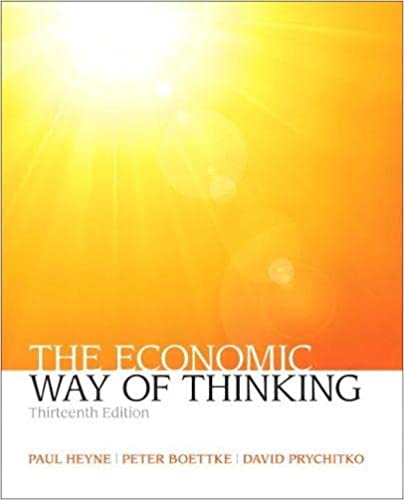
The Economic Way of Thinking 13th Edition by David Prychitko, Peter Boettke, Paul Heyne
Edition 13ISBN: 9780132992695
The Economic Way of Thinking 13th Edition by David Prychitko, Peter Boettke, Paul Heyne
Edition 13ISBN: 9780132992695 Exercise 9
Daniel Kahneman, Jack L. Knetsch, and Richard Thaler have done research on the notions of fairness that people apply to market transactions. One of their articles, titled "Fairness as a Constraint on Profit Seeking: Entitlements in the Market," reports the results of a public opinion survey designed to determine the rules of fairness people use in evaluating actions by business firms. Here is one hypothetical situation that was described in the survey:
A grocery store has several months' supply of peanut butter in stock, which it has on the shelves and in the storeroom. The owner hears that the wholesale price of peanut butter has increased and immediately raises the price on the current stock of peanut butter.
Of the 147 respondents surveyed, only 21 percent thought this was acceptable behavior while 79 percent deemed it unfair.
(a) The wholesale price of peanut butter in stock is a sunk cost. Is it relevant to pricing decisions for a seller who shares the majority view on fairness in pricing?
(b) How could it be relevant to a seller who personally holds the minority view, but also knows that his customers will find out what he has done if he raises the price on "old" stock?
(c) The economic way of thinking does not usually distinguish a sum of money paid out from a sum of money not received : Both are equally costs. The majority of the public apparently does distinguish, because it holds that sellers may raise their prices to cover higher wholesale cost payments, but may not do so merely because consumers are willing to pay the higher prices. Can you defend the popular distinction, or do you think it is simply the product of failure to understand what's going on?
A grocery store has several months' supply of peanut butter in stock, which it has on the shelves and in the storeroom. The owner hears that the wholesale price of peanut butter has increased and immediately raises the price on the current stock of peanut butter.
Of the 147 respondents surveyed, only 21 percent thought this was acceptable behavior while 79 percent deemed it unfair.
(a) The wholesale price of peanut butter in stock is a sunk cost. Is it relevant to pricing decisions for a seller who shares the majority view on fairness in pricing?
(b) How could it be relevant to a seller who personally holds the minority view, but also knows that his customers will find out what he has done if he raises the price on "old" stock?
(c) The economic way of thinking does not usually distinguish a sum of money paid out from a sum of money not received : Both are equally costs. The majority of the public apparently does distinguish, because it holds that sellers may raise their prices to cover higher wholesale cost payments, but may not do so merely because consumers are willing to pay the higher prices. Can you defend the popular distinction, or do you think it is simply the product of failure to understand what's going on?
Explanation
Since the grocery store owner has large ...
The Economic Way of Thinking 13th Edition by David Prychitko, Peter Boettke, Paul Heyne
Why don’t you like this exercise?
Other Minimum 8 character and maximum 255 character
Character 255


